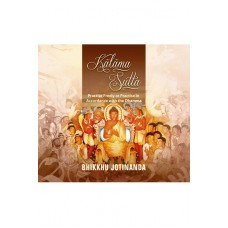by BHIKKHU JOTINANDA
ISBN 983-3512-04-1
IJ196/12
Size: 6” x 5.5”
Pages: 60 pages
The Kālāma Sutta is often adduced to illustrate the spirit of free-inquiry in the Buddha's teaching and its non-dependence on blind dogmatic belief in order to command the faith of its followers. In this Sutta the Buddha cautioned against the use of indiscriminate faith and belief when approaching a spiritual teaching. He also seems to encourage one to employ personal consideration in deciding if a particular teaching is acceptable. This has led many to think that the Buddha encourages an absolutely free and unrestricted approach to the practise of the Dhamma, an approach unrestricted even by the fundamental doctrine and philosophy of the Buddha's Dhamma.
What often goes unnoticed or even ignored, however, is that the message of this Sutta also cautioned against improper or misguided use of intellect in one's approach to a spiritual teaching, which is often the case if one were to approach the Dhamma freely without regard for its basic doctrine and philosophy. One would then indulge freely in personal ideas and opinions as to what one feels should be the correct interpretation of the Buddha's teaching.
This essay attempts to show that what the message of the Kālāma Sutta actually entails for one who is practising the Dhamma is the cultivation an attitude of balance between faith on the one hand and wisdom on the other. For, while a degree of healthy doubt is, no doubt, encouraged by the Buddha and is preferable to vacillating-doubt (vicikicchā), any excess on the side of either faith or wisdom throws the practise off balance, off the right track. In making this point, the importance of right view as a basis for the practise of the Dhamma is emphasised, and an approach to the practise that is in accordance with the Dhamma is also described which demonstrate how this fine balance between faith and wisdom is maintained. As a related topic the essay also discusses the difference between the practise of the Dhamma and the method of scientific inquiry.
ABOUT THE AUTHOR
VENERABLE JOTINANDA is a Malaysian Theravāda Buddhist monk who was ordained a sāmanera (novice monk) in Malaysia in 2001 and later a bhikkhu (full-fledged monk) in Myanmar in 2002. He first encountered the Dhamma (teaching of the Buddha) and started practising vipassanā meditation back in 1988.
He is interested in Buddhist meditation, especially vipassanā meditation, and also the study of the Dhamma, particularly where it deals with the practice of vipassanā meditation. Since he took up the robe he had had the opportunity to learn and practise vipassanā meditation under various teachers both in Myanmar and Malaysia. Besides learning and developing the practical aspect of the Dhamma in retreats he spends most of his other time also exploring and investigating the rich ancient wisdom as recorded in the vast scriptural texts of the Theravāda tradition to which he belongs.
Occasionally he writes essays about the Dhamma, mostly about vipassanā meditation or related topics, but occasionally also about his observation and comments on contemporary development in modern day Buddhist beliefs and practises. Some of these essays can be read on-line on his blog: anupassi.blogspot.com. In recent years he had also lead vipassanā retreats on invitation from time to time in several meditation centres in Malaysia.
KALAMA SUTTA
- Product Code: IJ196/12
- Availability: 349
-
0.00

